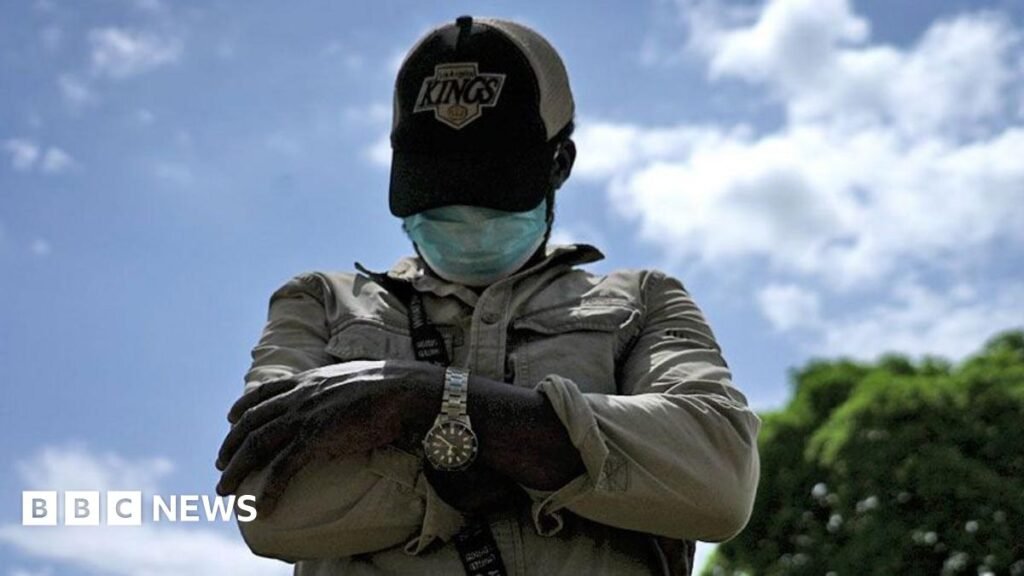A Ghanaian security officer stationed along the border with Burkina Faso told the BBC that the jihadists often crossed the border to regroup under pressure from Burkina Faso’s military – and they also used the country to smuggle weapons, food and fuel.
“This is dangerous for Ghana. They are hiding in towns like Pusiga. Residents of border communities are worried because there is no tight security there,” he added.
In a report published in July, externalThe think tank of the Netherlands Institute of International Affairs said “the lack of actual attacks on Ghanaian soil appears to be a result of JNIM’s calculation not to disrupt supply lines and rest areas, and not to provoke a relatively strong army.”
“The examples of people who have been spared by JNIM by showing their Ghanaian IDs are consistent with this reading,” the report added.
Most Ghanaians are Christian, but the population near the border with Burkina Faso is largely Muslim – and parts of the region are also riven by ethnic tensions, raising fears that jihadists could use them to their advantage.
The think tank said JNIM had tried in a “very small number” of cases to recruit or incite Ghana’s small, mainly Muslim Fulani community to carry out attacks.
JNIM claimed they had been marginalized but its recruitment efforts had “minimal success” as the Fulani “knew the chaos that had engulfed the Sahel due to family networks” and did not want that to happen in Ghana, the think tank added. .
A Fulani Muslim preacher in Burkina Faso, Amadou Koufa, is one of the founders of JNIM and its second leader. It recruits most of its fighters from the Fulani community in Burkina Faso.
Rights groups have accused the military of retaliating by stigmatizing the Fulani and carrying out indiscriminate attacks on their villages in Burkina Faso.
In 2022, the French NGO Promediation said its research showed that the jihadists had recruited between 200 and 300 young Ghanaians.
While some were active in insurgency-hit countries such as Burkina Faso, others were sent back to their villages in northern Ghana to preach their “radical faith”, it added.
This could eventually lead to jihadists gaining a “firm foothold in remote and peripheral areas in the north,” the NGO said.
From 2022, Ghana is at the forefront of a Western-backed effort to create a new 10,000-strong regional force to fight an Islamist insurgency.
Tamale – the largest city in northern Ghana – is to be the headquarters of the force.
However, the headquarters has not yet been opened, and the further fate of the initiative after the division of the region between pro-Western and pro-Russian states is still unknown.
Burkina Faso – together with Mali and Niger – turned to Russia. The three countries formed their own alliance to fight the rebels, and also relied on the help of Russian mercenaries.
Ghana and other regional powers remain allied with the West.
Ghana’s military has set up bases in the north of the country, but newly installed equipment to monitor the border is not yet operational, a security official told the BBC on condition of anonymity.
However, more troops were deployed on the Burkina Faso side of the border after JNIM carried out two attacks, late last year and early this month, the officer added.
The Ghanaian government did not respond to a BBC request for comment.
However, its ambassador to Burkina Faso, Bonifacio Gambila Adagbila, told the BBC that the two countries were helping each other fight the insurgency, warning that if Burkina Faso failed, “Ghana could be next.”
Ghana’s National Democratic Congress (NDC), which will form the next government after winning elections on December 7, promised in its election manifesto to “enhance” border security with “international partners” as well as improve the country’s intelligence capabilities.
In August 2023, the European Union announced that it would supply Ghana with around 100 armored vehicles, as well as surveillance equipment such as drones, as part of a €20m ($21.6m; £16.6m) aid package.
Many civilians and refugees cross the border between Ghana and Burkina Faso on footpaths and paths to work, trade or visit relatives despite the security risks – and James said he was one of them. He was traveling all the way to Senegal on his motorcycle when he was captured.

